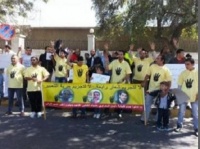Home » Jordan » Press Releases » JOR - News » Jordan: Stop Trial of Political Activists In Front of the State Security Court
On 27 September 2013, the Jordanian Preventive Security arrested Mr Al Bahrawy and Mr Al Shalaby while they were hanging up posters with the sign of R4BIA in a street in Jebel Al Manara, Amman. Both men were then taken to Al Manara Police Station, Amman, where they were handed over to the regular Police under the control of the Public Security Directorate. Mr Qafisheh was arrested the following day, 28 September, at 12 am, when the Preventive Security raided his house, possibly on the suspicion that he supported the production of the R4BIA posters. His laptop and hard disk were confiscated, and he was brought to Al Manara Police Station as well. The three young men were then sent to Al Juweida Prison in Amman for two days. Afterwards, they were transferred to Al Ramamin Prison, Al Salt Town, West of Amman, where they are being held to date.
The three men report that during the first hours of their respective detention at Al Manara Police Station, they were repeatedly subjected to beatings on different parts of their bodies by the Police. The beatings seem to have been carried out to extract information, as the arrestees were repeatedly asked about their political activities. The beatings caused the rupture of Mr Al Bahrawy's eardrum, but he did not receive any medical attention to date, even though his lawyer repeatedly requested this.
The lawyer also submitted a complaint to the Public Security Directorate on behalf of the three men, alleging that his clients had been subject to torture at Al Manara Station and requesting immediate forensic exams for all three of them. However, the Jordanian authorities failed to duly investigate these allegations and the three detainees were neither examined by a forensic doctor nor given medical support.
On 30 September, the three men were interrogated by a Prosecutor in the State Security Court (SSC). On 13 November, they were officially charged with undertaking unauthorised actions – the distribution of the R4BIA signs –, which may disturb Jordan's relations with a friendly Arab State, Egypt. This charge is based on Article 118 of the Jordanian Penal Code, which states that anyone who undertakes actions, writings or speeches that are not authorised by the Government and can expose the Kingdom to aggressive actions, affect its relations with a foreign country or expose Jordanians to revenge acts is to be sentenced to arrest for a period of no less than 5 years.
Mr Al Bahrawy was additionally charged with "improper language" and contempt for the Presidents of Arab countries since text messages mentioning some Arab Presidents in a negative way were found on his phone. This charge is based on Article 122 and Article 195 of the Jordanian Penal Code. Article 122 criminalises offending or defaming a foreign State, Army, President, or any of its political representatives in Jordan. Article 195 provides that anyone who defames the King through speech, writing, electronic texts, cartoons, or through other means can be sentenced to up to three years in prison.
After the three men's first hearing before the SSC took place this past Wednesday, 13 November 2013, their trial was postponed to 20 November 2013. The three judges within the SSC refused the lawyer's request of releasing the three men on bail, or transferring the case to an ordinary court.
We recall that the State Security Court (SSC), working closely with the General Intelligence Directorate (GID) and made up of judges appointed by the Prime Minister, is notorious for its disrespect of defendant's right to a fair trial. According to the Court's regulations, Prosecutors must bring defendants before the SSC no more than seven days following their arrest, but provisions allow for an extension of the pre-trial detention without trial at the discretion of the Prosecutor for a period of up to fifteen days. In practice, however, detainees are often held for a much longer period with no trial. Also, in many cases defendants have not been granted access to legal counsel, especially during investigations. The Court's procedures further stipulate that statements made to the Prosecutor, which form the basis of court proceedings, must be made voluntarily, though many defendants later claim that they made statements under duress. Finally, and although the Jordanian authorities have stated that the jurisdiction and scope of the SSC shall be limited, in practice, there are civilians still being tried before the court.
Alkarama has previously – including in its report for Jordan's second Universal Periodic Review (UPR) – highlighted that the Jordanian authorities should abolish the SSC, as we consider the fair trial guarantees before an exceptional court to be per se insufficient. We also repeatedly called on the authorities to refrain from the prosecution of activists in relation to their activities. Similar recommendations to limit the jurisdiction of the court or to abolish it altogether, and to stop trying persons in violation of their right to freedom of expression, were most recently suggested during Jordan's UPR by the Netherlands or Canada , and had already been formulated by the UN Human Rights Committee and the UN Committee against Torture.
In light of the above, Alkarama calls on the Jordanian authorities to end the men's arbitrary detention by granting them a fair trial before an ordinary court or by releasing them immediately. We in addition submitted a communication to the UN Working Group on Arbitrary Detention, requesting the Working Group issue an Opinion as to the arbitrary nature of the detention of the three activists and their trial before the State Security Court.
 Algeria
Algeria Bahrain
Bahrain Djibouti
Djibouti Egypt
Egypt Iraq
Iraq Palestine/Israel
Palestine/Israel Jordan
Jordan Kuwait
Kuwait Lebanon
Lebanon Libya
Libya Mauritania
Mauritania Morocco
Morocco Oman
Oman Qatar
Qatar Saudi Arabia
Saudi Arabia Sudan
Sudan Syria
Syria Tunisia
Tunisia United Arab Emirates
United Arab Emirates Yemen
Yemen Other Countries
Other Countries


